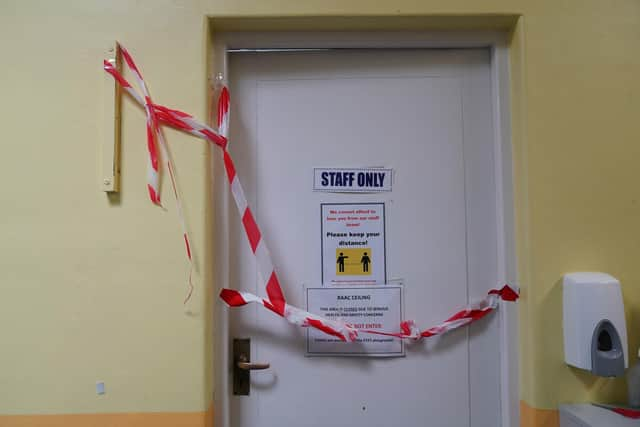No North Northamptonshire schools closing due to RAAC 'at this stage' says councillor
and live on Freeview channel 276
The councillor in charge of north Northants schools has confirmed that no settings are due to close ‘at this stage’ due to issues with RAAC.
A total of 156 schools across the country have been notified about the dangers of reinforced autoclaved aerated concrete.
Advertisement
Hide AdAdvertisement
Hide AdSome buildings are at risk of collapse as RAAC has reached the end of its safe life.


North Northamptonshire Council confirmed they have been working with the Department for Education (DfE) and health and safety experts on ‘issues’ caused by the use of RAAC.
Cllr Scott Edwards, North Northamptonshire Council’s executive member for children, families, education and skills, said: “We are working with the Department of Education and our health and safety colleagues on the issues caused by the use of RAAC concrete.
“At this stage no schools have been identified as needing to close in North Northamptonshire, we will continue to work with colleagues from DfE to ensure all checks are carried out appropriately with our schools.
Advertisement
Hide AdAdvertisement
Hide Ad“The safety of our local schools, their children and staff is a top priority.”
The Government has announced the immediate closure of buildings at over 100 schools in England after they were found to be dangerous.
This week, the DfE contacted all settings where RAAC is currently confirmed to be present without mitigations in place, to ask them to vacate rooms or buildings that are known to contain RAAC.
It comes after reports emerged earlier this week that scores of schools could be at risk of collapse - as they had been built with ‘crumbly’ RAAC between the 1960s to 1990s, which only has a life expectancy of three decades.
Advertisement
Hide AdAdvertisement
Hide AdMeanwhile, a report in June by the National Audit Office (NAO) said that the risk of injury or death from a school building collapse in England was “very likely” - as it warned of the “critical” danger to pupils and staff.
RAAC is a lightweight type of concrete. However, a large portion of the RAAC found in schools has passed the end of its safe life and is now in danger of collapsing, even though it is still made and can be used safely.
The Standing Committee on Structural Safety has noted that: "Although called ‘concrete’, (RAAC) is very different from traditional concrete and, because of the way in which it was made, much weaker."
The Department for Education has yet to release the full list, but headteachers and local authorities have been informed and will be making plans. Parents will also be contacted directly.
Advertisement
Hide AdAdvertisement
Hide AdThe impact of RAAC is varied. Some settings may have very little RAAC present with limited disruption as a result.
In 2022, the DfE sent a questionnaire to schools, asking them to provide information to help them understand the use of RAAC and make sure the correct support is in place.
In June, a report by the National Audit Office said that of 196 assessments that had been completed, 65 had been found to have RAAC. More have been completed over the summer.
The decision to actually close schools was taken within the last week after the DfE was made aware of two more collapses of buildings with RAAC. As a result, it notified schools that such buildings were not safe for children.